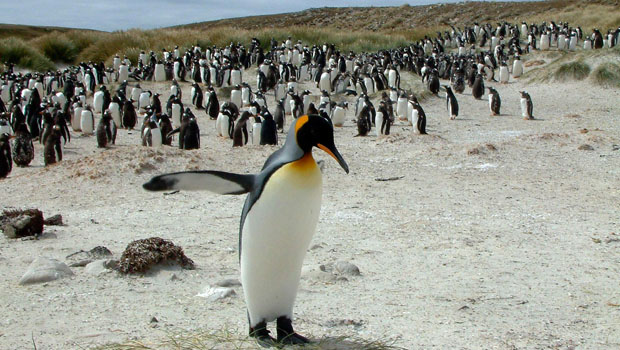British oil company Rockhopper Exploration Plc said this month it found high quality oil north of the wind-swept archipelago in the southern Atlantic ocean, but future drilling was needed to confirm whether it is a commercial discovery.
In the past, oil exploration has lifted expectations on the Falklands — home to about 3,000 people — without leading to production.
But the new potential has excited local businessmen who see major knock-on effects for the tiny fishing and tourism economy.
"I think it will be transformational... Just the very scale of it is enormous on the economy," said Falkland Islands Chamber of Commerce President Roger Spink, who is a director of a company that has shares in another oil exploration company.
An impact assessment prepared for the Falklands during oil exploration in the 1990s forecast the population of the islands could double if large amounts of oil were found.
Spink and others anticipate Falklanders will have to fight to maintain their quiet lifestyle in the tiny capital of Stanley and on remote farms scattered across the mostly treeless two main islands.
They are also concerned about increased tensions with Argentina, which has vowed to block oil drilling in the islands it calls the Malvinas.
In 1982 Argentina invaded the islands and, after a two-month war that killed more than 900 troops, surrendered to Britain. However, it continues its claim to the territory.
The residents of the Falklands speak English and want the islands to remain British — they are protected by British troops on an army base — but say they are willing to discussing sharing of business opportunities.
"We are willing, of course, to talk with Argentina on many issues such as the impacts of fishing and potential ... hydrocarbon straddling reserves," said Emma Edwards, a member of the Falklands Legislative Assembly.
The islands are about 400 miles (640 km) off the coast of Argentina, which is now demanding special permits for any ships bound for the Falklands from its ports. The idea is to complicate logistics for any oil explorers that want to get supplies from South America.
"They are always rattling their sabers and trying to enforce the fact that we are Argentine but we're not of course, we're British and we know we're British," said Alison Howe, a 50-year-old shop owner in Stanley.
Others are concerned for wildlife, including some of the world's largest breeding populations of rockhopper penguins, gentoo penguins and black-browed albatross as well as marine invertebrates unique to the archipelago's 700 mostly small islands.
A rich biodiversity teems both offshore in bone-chilling waters and onshore where native grasses and lichens grow in the spongy, marshy peat. Scientists say there is still a lot of research to be done to fill in information gaps on species.
"Obviously there is a very sensitive environment here, very rich biodiversity and I think it is very important that as ... (oil) development proceeds, it needs to be very considerate of the environment and the wildlife," said Craig Dockrill, chief executive of Falklands Conservation, the local environmental watchdog.
In light of a huge oil spill from offshore drilling in the Gulf of Mexico, conservation groups say the Falklands could not handle an environmental rescue if it had to deal with a spill.
Conservation groups say the islands have capacity to treat only 20 oil-soaked penguins, so large quantities of emergency supplies would need to be purchased and contingency plans created to fly rescuers in if there were a large oil spill.
A good deal of the Falklands economy is now based on tourism linked to wildlife viewing, such as bird-watching.
"The Falklands has always taken the environment as a very high stance and we have taken very seriously the environmental impacts," Edwards said.










